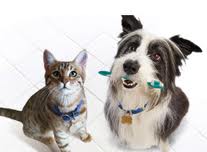February Is National Pet Dental Health Month
 Dental disease affects up to 80% of pets over three and can lead to serious consequences of poor dental health. These consequences can include heart, kidney, intestinal tract and joint infections.
Dental disease affects up to 80% of pets over three and can lead to serious consequences of poor dental health. These consequences can include heart, kidney, intestinal tract and joint infections.
Bad breath is often the first indication of dental disease. You as pet owners, can check your pets teeth by lifting up the lips and checking for tartar, inflamed gums, or missing/broken teeth. Sometimes cats may exhibit excessive drooling. Your pets also may be reluctant to eat or chew. If the clinical signs are caught early, you can prevent further damage.
It is best to start early taking care of teeth as puppies and kittens. It is best to ask your veterinarian to show you how to brush the teeth of your pets. One thing that pet owners must never do is use human toothpaste. When a dental cleaning is done, it consists of tartar removal, checking for cavities, gingival pockets, loose teeth, any growths on the gums or palate, extraction of the diseased teeth and finally polishing. The polishing smooths the teeth to prevent tartar formation.
It is good practice to visit your veterinarian for a dental check up. If cleaning is neccessary, pre-anesthetic bloodwork will make sure there are no underlying health problems.
